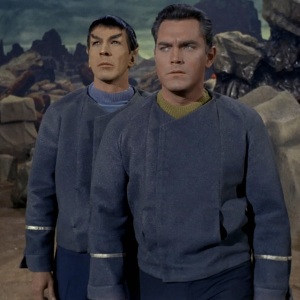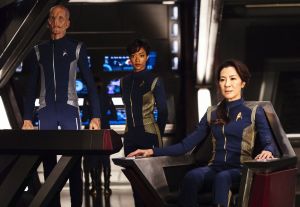Star Trek: Review: Discovery: Desperate Hours
By David Mack Gallery, out now After an ancient spaceship is discovered on a Federation colony world, the talents of many of Starfleet’s finest will be called upon… Star Trek: […]
By David Mack Gallery, out now After an ancient spaceship is discovered on a Federation colony world, the talents of many of Starfleet’s finest will be called upon… Star Trek: […]
Gallery, out now
After an ancient spaceship is discovered on a Federation colony world, the talents of many of Starfleet’s finest will be called upon…
Star Trek: Discovery is less than a week old when I write this; we’ve had the first two episodes at the end of which there’s a major paradigm shift that will affect the rest of the series (I’m being cautious for those who may only have seen episode 1). We’re not necessarily going to focus going forward on some of those who we’ve just spent two hours with…
Often when new Star Trek series have started, there’s been a link with the past: The Next Generation’s pilot featured an elderly Dr McCoy; Deep Space Nine began with a new angle on a key TNG event; Voyager’s er… voyage began from DS9; even Enterprise linked back to Star Trek: First Contact.
Discovery can’t do that. It’s set in 2256, ten years before Jim Kirk (so he and most of his crew are either elsewhere in Starfleet or not yet joined up). The only connection we could have is with the earlier crew of the Enterprise, as seen in the original pilot, The Cage: Captain Christopher Pike, his mysterious Number One (known as Una in the novels now), and the science officer, half-human, half-Vulcan Mr Spock – a younger, and somewhat immaturer version of the character we’ll come to know. So, yes, Bryan Fuller could have started the show with an Enterprise crew working with the Shenzhou… but for one problem: time. Forget the question of aging: Jeffrey Hunter (Pike) died in 1969; Majel Barrett (Una) died in 2008; Leonard Nimoy died two years ago – every major role would have needed recasting, which would defeat the purpose of involving them.
 But books don’t have that problem. Chris Pike, Una, and a host of other characters whose actors have passed away, continue to appear in the line, and what David Mack gives us in Desperate Hours is effectively that “pilot” story – introducing the crew of the Shenzhou through the eyes of characters who are familiar to us, albeit from reading the novels rather than seeing them on screen. And we learn a great deal about them by the way they’re reflected through those eyes.
But books don’t have that problem. Chris Pike, Una, and a host of other characters whose actors have passed away, continue to appear in the line, and what David Mack gives us in Desperate Hours is effectively that “pilot” story – introducing the crew of the Shenzhou through the eyes of characters who are familiar to us, albeit from reading the novels rather than seeing them on screen. And we learn a great deal about them by the way they’re reflected through those eyes.
Now of course I’d be amazed if that was actually the logic behind Fuller’s request to Mack to write this story. There’s a far clearer link: Michael Burnham, the new show’s lead character, has a relationship with Sarek, Spock’s father. Most Trek fans know that at the time Discovery is set, Sarek and Spock are at odds, over his choice to enter Starfleet… and yet we know from the broadcast episodes that Sarek doesn’t appear to have a problem with Burnham being part of Starfleet. So what would happen if Spock and Burnham actually had to work together to solve a problem?
And that’s one of the cores of this novel. There are so many ways that Spock and Burnham are inverted mirrors of each other, and Mack gets to the heart of it during a lengthy sequence in which they are cut off from everyone else on either Starfleet ship, and are put to tests that require them not just to cooperate with but to trust each other.
Mack teased his novel online saying that after the first two episodes aired, the audience would have lots of questions about Michael Burnham, and many of them are answered here – how she came to be first officer of the Shenzhou; the roots of her problem with Doug Jones’ character Saru; the basis on which Burnham and Captain Georgiou have built their relationship, among others, some of which it would be wrong to spoil.
 And there are plenty of answers about Georgiou and Saru too, as well as a huge expansion of the other members of the Shenzhou crew. (As a side note, I hope this novel sells well enough that we do get more stories set on that ship prior to The Vulcan Hello.) We learn a lot more about the capabilities of the ship, and – almost in passing – why things look different in Discovery, compared with either The Cage or the rest of the original series (the comparison with how tastes and styles change on Earth is an excellent one). At almost every turn, we’re reminded that the Starfleet Chris Pike and Spock belong to is the same one as Georgiou and Burnham do – they serve the same ideals, they face the same uncomfortable dilemmas… and critically, they’re regarded potentially as one enemy by those they oppose. The fact that the characters were created fifty years apart is irrelevant!
And there are plenty of answers about Georgiou and Saru too, as well as a huge expansion of the other members of the Shenzhou crew. (As a side note, I hope this novel sells well enough that we do get more stories set on that ship prior to The Vulcan Hello.) We learn a lot more about the capabilities of the ship, and – almost in passing – why things look different in Discovery, compared with either The Cage or the rest of the original series (the comparison with how tastes and styles change on Earth is an excellent one). At almost every turn, we’re reminded that the Starfleet Chris Pike and Spock belong to is the same one as Georgiou and Burnham do – they serve the same ideals, they face the same uncomfortable dilemmas… and critically, they’re regarded potentially as one enemy by those they oppose. The fact that the characters were created fifty years apart is irrelevant!
Although the main focus of the book is the Starfleet personnel, Mack doesn’t neglect to build credible characters among those on the planet – including the aliens whose rest has been disturbed. There’s something of Farscape’s Moya about the ancient ship, and Doctor Who fans may feel a certain sense of the tombs of Telos and Rassilon, but Mack ensures that it never feels as if the peril to the characters isn’t real.
It’s true to say that many of the early tie-in novels to the new Star Trek series took a bit of time to find their feet (to the extent that many of them feel like they’ve come from completely different shows to the ones produced). Mack has benefitted greatly from liaison via Kirsten Beyer with the Discovery production team and as a result I feel as if I know Captain Georgiou, Michael Burnham, Saru and the other Shenzhou crew considerably better now.
Verdict: A highly recommended expansion of the Discovery universe. 9/10
Paul Simpson